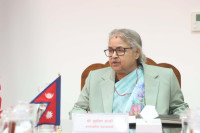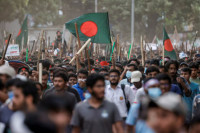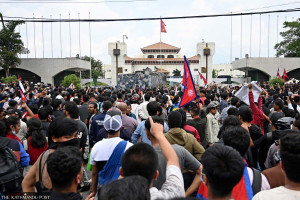Opinion
State of denial
If elites were committed to a just Nepal, state demarcation would not assume the significance it has today
Nirabh Koirala
From an institutional design perspective, that the demarcation of federal boundaries remains such a contentious issue in Nepali politics is perplexing, especially in the form that this debate continues to take place. The Madhesis want the inclusion of Jhapa, Morang and Sunsari in their federal region, citing the recommendations of the State Restructuring Committee of the first Constituent Assembly, whereas the conservative establishment of PM Oli et al want these districts in the eastern federal region, arguably to placate the sizable Pahadi population in these districts. Keeping with an institutional design perspective, this seems counter-intuitive: why should a marginalised minority seek the augmentation of its federal state with districts that have a substantial number of hill high castes—a move that would severely dilute its demographic advantage—while at the same time, why should conservative forces want less sway over one of the six provinces? In other words, assuming votes would divide on ethnic lines, having more Pahadi people in province 2 would mean less votes for the Madhesi leaders: why would they want Jhapa, Morang and Sunsari to be included, then, and why would conservative leaders not want more votes in the region?
Demarcation
A common explanation for why the conservative forces, including PM Oli, want these districts in province 1 suggests a form of political gerrymandering to consolidate power in these regions. This is a valid explanation that also underscores the vital fact that our constitution was never designed to broaden and consolidate democracy. However, as is the case in any political arena, interests are pursued and protected, and this case of political gerrymandering is no exception, and still begs the question of why the Madhesi Morcha would want these districts included in their province.
Another seemingly valid explanation falls along the lines of protecting national interests: granting the entire eastern Terai belt to the Madhesis would mean the possibility of Nepal being held hostage again through another blockade. However, the risk of blockade probably was not on the mind of the leaders of the top parties when they decided on the demarcation of the federal provinces, because this potential threat only materialised later on. Even so, this threat might explain partially why the position on the conservative side has been so intransigent in recent weeks, but does not explain why federalism in Nepal has historically been such a contentious issue.
In answering this question, I use an argument that I have made before: federalism in Nepal has turned into a symbolic politics trap, where the notion of federalism itself has morphed into an irrational symbol, and it is instead now a proxy for a debate much larger than institutional design alone. If this was truly a transformative era in Nepal’s history, with inclusiveness at its heart, this situation would not have arisen. Indeed, had our elites been committed to a Nepal free of social injustice, the demarcation of federal states would have never taken on the significance it has today. Instead, the fixation on federal borders has been fostered by the tone and attitude adopted by the conservative elites who run this country today, a tone and attitude in a state of denial of the social injustice that exists in contemporary Nepali society. These elites blame Nepal’s feudal past for the marginalisation of Madhesis, and in the process seek to absolve themselves of any blame for institutionalised racism within the state apparatus. The Human Rights Watch report, ‘Like We Are Not Nepali’ documents, objectively, both the systematic racism that grips our security forces as well as the violence committed by Tharus in Tikapur. While violence in any form should never be condoned, that somehow the death of eight policemen is infinitely more tragic in our national psyche than the arbitrary killing of more than 40 Madhesis with impunity points to something seriously problematic in our collective perception, and not just our leaders’; they are, after all, reflections of ourselves.
A universal thing
The tone of denial adopted by the conservative establishment is not a phenomenon unique to Nepal, because denial is used by establishment forces throughout the world to maintain the status quo. It is reminiscent of right wing political commentators in America who blatantly deny the existence of any form of white privilege, and blame black Americans for their own impoverishment. They deny white privilege despite glaring evidence in the form of massively disproportionate incarceration rates for blacks, as well as shocking incidents of police brutality towards black Americans, just to name one dimension of marginalisation.
In Nepal, then, having a constitution that nominally commits to equality is simply not enough because the means of marginalisation shifts from explicit, legal discrimination to implicit discrimination, as it has in America. Moving towards a polity with broad based ownership extends beyond pleasing semantics in our constitution; it entails reconceptualizing our national identity to be far more inclusive than it is today.
It is only when this is done that state building in Nepal can actually take place, and we can move on to, for example, consolidating local governance and building its fiscal capacity. Our nation as a political entity will never move forward if it is always on the brink of violent civil unrest, and we must preclude civil unrest by rethinking what it means to be Nepali.
Koirala is a student of economics and political science at Grinnell College, the US




 7.15°C Kathmandu
7.15°C Kathmandu










%20(1).jpg&w=300&height=200)

